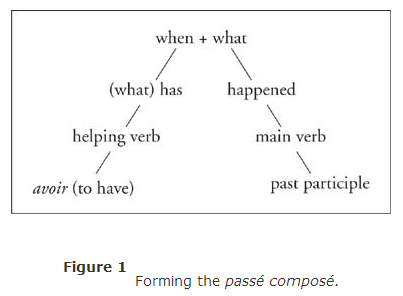The Passé Composé with Avoir
Using avoir as the helping verb is a logical choice in a tense that expresses an action that has occurred. Although English usage often omits the use of “have” when it is implied (You may say, “I lost my keys” and not, “I have lost my keys”), in French, you must always use the helping verb: J'ai perdu mes clefs.
To form the passé composé of verbs using avoir, conjugate avoir in the present tense (j'ai, tu as, il a, nous avons, vous avez, ils ont) and add the past participle of the verb expressing the action. Put the words together this way: subject + helping verb (usually avoir) + past participle.
The passé composé, a compound past tense, is formed by combining two elements: when (the action has taken place and, therefore, requires the helping verb avoir) and what (the action that has happened and, therefore, requires the past participle of the regular or irregular verb showing the particular action). See Figure 1.

Here are some examples of the passé composé.
Forming the negative in the passé composé with avoir
In a negative sentence in the passé composé, ne precedes the helping verb, and the negative word (pas, rien, jamais, and so on follows it:
Questions in the passé composé with avoir
To form a question in the passé composé using inversion, invert the conjugated helping verb with the subject pronoun and add a hyphen. Then place the negative around the hyphenated helping verb and subject pronoun:
Regular verbs follow a prescribed set of rules for the formation of the past participle, whereas irregular verbs (discussed in the following section) must be memorized. Past participles of verbs conjugated with avoir agree in gender (masculine or feminine — add e) and number (singular or plural — add s) with a preceding direct object noun or pronoun: